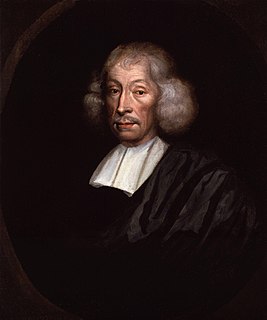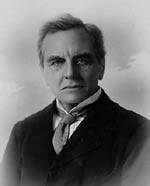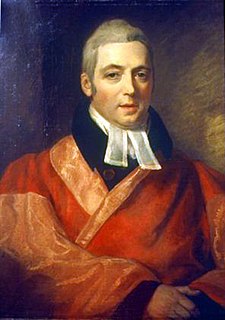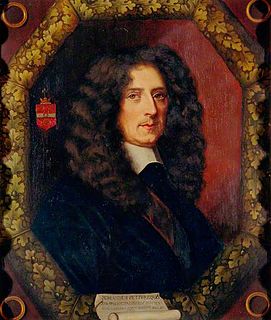| Charles Leigh | |
|---|---|
Charles Leigh, 1700 engraving by John Savage. | |
| Born | 1662 Singleton Grange |
| Died | 1701? |
| Nationality | British |
| Occupation | Naturalist |
| Known for | Fellow of the Royal Society |
Charles Leigh (1662–1701?) was an English physician and naturalist.
| Charles Leigh | |
|---|---|
Charles Leigh, 1700 engraving by John Savage. | |
| Born | 1662 Singleton Grange |
| Died | 1701? |
| Nationality | British |
| Occupation | Naturalist |
| Known for | Fellow of the Royal Society |
Charles Leigh (1662–1701?) was an English physician and naturalist.
The son of William Leigh of Singleton-in-the-Fylde, Lancashire, and great-grandson of William Leigh, was born at Singleton Grange in 1662. On 7 July 1679 he became a commoner of Brasenose College, Oxford, where he graduated B.A. on 24 May 1683. [1] Anthony Wood recorded that he left Oxford in debt; he went to Jesus College, Cambridge, and graduated M.A. and M.D. (1689) there. [2]

Lancashire is a ceremonial county in North West England. The administrative centre is Preston. The county has a population of 1,449,300 and an area of 1,189 square miles (3,080 km2). People from Lancashire are known as Lancastrians.
William Leigh (1550–1639) was an English clergyman and royal tutor. He is now remembered for his sermon series Queene Elizabeth paraleld from 1612, which includes the first published text record for the queen's speech to the troops at Tilbury from 1588.

Brasenose College (BNC), officially The King's Hall and College of Brasenose, is one of the constituent colleges of the University of Oxford in the United Kingdom. It was founded in 1509, with the library and chapel added in the mid-17th century and the new quadrangle in the late 19th and early 20th centuries.
Leigh was on 13 May 1685 elected a Fellow of the Royal Society. When Wood wrote his Athenæ Oxonienses, Leigh was practising in London; but he lived at Manchester at a later date, and had an extensive practice in Lancashire. He is said to have died in 1701, but there is some doubt on this point. [1]

Fellowship of the Royal Society is an award granted to individuals that the Royal Society of London judges to have made a 'substantial contribution to the improvement of natural knowledge, including mathematics, engineering science and medical science'.

Manchester is a city and metropolitan borough in Greater Manchester, England, with a population of 545,500 as of 2017. It lies within the United Kingdom's second-most populous built-up area, with a population of 2.8 million. It is fringed by the Cheshire Plain to the south, the Pennines to the north and east, and an arc of towns with which it forms a continuous conurbation. The local authority is Manchester City Council.
Some of Leigh's papers read before the Royal Society are printed in the Philosophical Transactions , and he published the following separate works:
He also wrote three pamphlets in 1698 in answer to Richard Boulton on the Heat of the Blood, and one in reply to John Colebatch on curing the bite of a viper. His Natural History is little more than a translation of his earlier Latin treatises. Thomas Dunham Whitaker later wrote slightingly of Leigh's "want of literature".
Richard Boulton, was a physician and author from England.

Thomas Dunham Whitaker (1759–1821) was an English clergyman and topographer.
Leigh married Dorothy, daughter of Edward Shuttleworth of Larbrick, Lancashire, with whom he received a moiety of the manor of Larbrick, afterwards surrendered in payment of a debt owing by Leigh to Serjeant Reginald Bretland. He left no issue. His widow died before 1717. [1]

John Ray FRS was an English naturalist widely regarded as one of the earliest of the English parson-naturalists. Until 1670, he wrote his name as John Wray. From then on, he used 'Ray', after "having ascertained that such had been the practice of his family before him". He published important works on botany, zoology, and natural theology. His classification of plants in his Historia Plantarum, was an important step towards modern taxonomy. Ray rejected the system of dichotomous division by which species were classified according to a pre-conceived, either/or type system, and instead classified plants according to similarities and differences that emerged from observation. He was among the first to attempt a biological definition for the concept of species.

Gilbert Sheldon was the Archbishop of Canterbury from 1663 until his death.

Sir James Phillips Kay-Shuttleworth, 1st Baronet of Gawthorpe Hall, Lancashire, was a British politician and educationist.

Charles Edward Montagu, 1st Duke of Manchester PC of the Noble House of Montagu, previously 4th Earl of Manchester, son of Robert Montagu, 3rd Earl of Manchester, was educated at Trinity College, Cambridge, and succeeded to his father's earldom in 1683. Warmly sympathizing with the Whig revolution of 1688, he attended William and Mary at their coronation, and fought under William at the Boyne.

John Theophilus Desaguliers FRS was a French-born British natural philosopher, clergyman, engineer and freemason who was elected to the Royal Society in 1714 as experimental assistant to Isaac Newton. He had studied at Oxford and later popularized Newtonian theories and their practical applications in public lectures. Desaguliers’s most important patron was James Brydges, 1st Duke of Chandos. As a Freemason, Desaguliers was instrumental in the success of the first Grand Lodge in London in the early 1720s and served as its third Grand Master.
Henry Ferne was an English bishop.

Prof William Johnson Sollas PGS FRS FRSE LLD was a British geologist and anthropologist. After studying at the City of London School, the Royal College of Chemistry and the Royal School of Mines he matriculated to St. John's College, Cambridge, where he was awarded First Class Honours in geology. After some time spent as a University Extension lecturer he became Lecturer in Geology and Zoology at University College, Bristol in 1879, where he stayed until he was offered the post of Professor of Geology at Trinity College, Dublin. In 1897 he was offered the post of Professor of Geology at the University of Oxford, which he accepted.
Sir Peter Wyche was an English diplomat and translator.

William Levett, Esq., was a long serving courtier to King Charles I of England. Levett accompanied the King during his flight from Parliamentary forces, including his escape from Hampton Court palace, and eventually to his imprisonment in Carisbrooke Castle on the Isle of Wight, and finally to the scaffold on which he was executed. Following the King's death, Levett wrote a letter claiming that he had witnessed the King writing the so-called Eikon Basilike during his imprisonment, an allegation that produced a flurry of new claims about the disputed manuscript and flamed a growing movement to rehabilitate the image of the executed monarch.

Sir Norman Moore, 1st Baronet FRCP was a British doctor and historian, best known for his work with the Royal College of Physicians and his writings on history of medicine. Born in Higher Broughton, Salford, Lancashire, the only child of abolitionist and social reformer Rebecca Moore, née Fisher, of Limerick and the noted Irish political economist Robert Ross Rowan Moore, Moore worked in a cotton mill before studying natural sciences in Cambridge and then going on to study comparative anatomy at St Bartholomew's Hospital.
Lawrence Rooke was an English astronomer and mathematician. He was also one of the founders of the Royal Society, although he died as it was being formally constituted.

Stephen Gaukroger, is a British/Australian historian of philosophy and science. He is Emeritus Professor of History of Philosophy and History of Science at the University of Sydney.
Charles Hotham was an English cleric.
Henry Paman (1626–1695) was an English physician.
William Quatremaine or Quatremain was an English physician who served King Charles II in exile and a politician who sat in the House of Commons from 1662 to 1667.
Henry Jackson (1586–1662) was an English priest and literary editor.
Michael Tyson (1740–1780) was an English Anglican priest, academic, antiquary, and artist.

William George Maton M.D. was an English physician, a society doctor who became associated with the British royal family. He published on natural history and antiquarian topics.

Sir John Pettus (1613–1685) was an English royalist, politician and natural philosopher.
William James Russell (1830–1909) was an English chemist and Fellow of the Royal Society.
![]()
The public domain consists of all the creative works to which no exclusive intellectual property rights apply. Those rights may have expired, been forfeited, expressly waived, or may be inapplicable.

Sir Sidney Lee was an English biographer, writer and critic.

The Dictionary of National Biography (DNB) is a standard work of reference on notable figures from British history, published since 1885. The updated Oxford Dictionary of National Biography (ODNB) was published on 23 September 2004 in 60 volumes and online, with 50,113 biographical articles covering 54,922 lives.